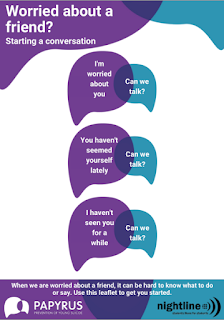This year we are glad to be affiliated with the University
of London. As such, we are working to make our service more accessible to independent
students or those studying at Teaching Institutions worldwide. Wherever
students are based, they now have access to our listening service and, as such,
emotional and practical support from our trained student volunteers in London.
We currently offer the following services: phone, text,
instant message, email and our reopened Skype Phone.
Instant Messaging and
Email
The instant messaging (IM) and email service can be accessed
from anywhere for free (unlike texting). If you prefer a written format, we
encourage you to use our IM service, as it is the easiest way to have a
conversation in real-time. Our IM service can be found on the right side of any
page on
our website, and once you click ‘chat’ when
we are online you’ll get through to our volunteers.
If you would prefer to talk to us, we presently offer
a Skype Phone system
that allows you to talk to our volunteers as if using a mobile phone. This
service is simply the audio of a Skype Call; we never accept video chats so
that both the volunteer and caller remain anonymous. You can access this
service by downloading Skype, and then calling our account: londonnightline.
The connection depends on the level of internet access, so
if the call drops please try and call back, or alert us to this via chat. We
encourage you to create an anonymous account, although this is up to you to
decide. Our team is currently looking into more anonymous services that allow
for charge-free international calling. We delete any contacts at the end of
every shift, but you can still contact us again.
Phone and SMS/Texting
For students based in the UK, we offer a phone and text service
based on your own network charges. Please be aware that if you use these
services, you may incur additional charges based on your telephone plan (if you
prefer a free call, use skype as mentioned above).
The phone number to call is +4420 7631 0101, or text us on +44771 798 9900.
Opening Hours
Our service is open from 6pm to 8am (GMT+1) every night of British
term dates, with emails replied to every day of the year. We will be open until the 29th March 2018, at which
point we will be closed for a short period, before reopening on the 16th
April 2018. We’ll close for summer on the 22nd June 2018, and reopen
in mid-September.
To see what time it is in London to talk to our volunteers,
please check
this
clock.
While the main part of our service is offering students a
place to talk openly and confidentially about whatever is on their mind, we
also provide information when requested. We will do our best to find
information that is most suitable and appropriate for you where possible.
Find Out More
For more information about our service and what to expect
from a call, please check out
our website.



